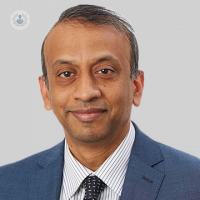Snoring and sleep apnoea
Autore:Although sleep apnoea only affects a small percentage of the population, it can be detrimental to our health and our relationships. ENT Surgeon, Mr Prasad Kothari is here to unpack this condition for us.

Snoring is an issue which is familiar to most of us, it affects roughly 40 per cent of men and over 20 per cent of women. Sleep apnoea, however, is not as common, between three and five per cent of adults are affected by this condition, which is at the other end of the sleep disordered breathing spectrum. Snoring is defined as excessively loud breathing while asleep, which is usually more problematic for the partner than the person snoring.
Conversely, sleep apnoea, if untreated, can have negative effects on one’s health. One of the milder symptoms of sleep apnoea is snoring, however in more extreme cases it can cause breathing difficulties during sleep, sometimes numerous times in one night. Aside from disrupting your sleep, this can also lead to a shortage of oxygen in the blood flow.
How do I know if I have sleep apnoea?
Less severe cases of sleep apnoea often remain undetected, especially in single people. For those sharing a bed, it’s usually a partner who first notices periods of not breathing. Sleep apnoea patients often cite daytime tiredness and sleepiness as problematic symptoms, which can lead to a decreased attention span and difficulty concentrating at school or work.
While the problems caused by snoring alone tend to be more related to social or marital life, e.g., partners or friends not wanting to share a bed or room with a snorer, sleep apnoea can lead to problems with both the heart and brain.
What causes snoring and sleep apnoea?
Men are more likely to snore than women, although post-menopausal women have a higher incidence rate. The likelihood and severity of both snoring and sleep apnoea increase in direct correlation with the patient’s weight. Internal structural deformities like nasal polyps, a deviated nasal partition, or large tonsils, which can partially block the throat, can also contribute to both conditions.
How is sleep apnoea diagnosed?
In order to correctly diagnose sleep apnoea, a patient’s general medical history as well as the history of the condition is checked. A thorough examination of the mouth and throat will also help diagnosis. In some cases, a sleep study, which involves staying overnight at a facility while specialists assess your breathing, may be recommended.
These days there are some free apps that allow patients to self-diagnose, however a lot of the apps aren’t certified by any medical authority, so it’s always important to visit a specialist.
Can it be treated?
The severity of each case determines the most effective treatment option. Generally, breathing exercises (while awake) and lifestyle changes like weight loss and lowering alcohol intake can help those with less severe cases. Nasal polyp or tonsil removal can also help in cases caused by airway blockage, especially when snoring is the principal symptom.
Extreme cases are often treated long-term with a CPAP device which is a face mask that delivers oxygen into the airways while sleeping, or with surgery, under general anaesthetic.
Some companies sell devices which they want us to believe will stop snoring, however, as with the apps mentioned previously, they aren’t clinically proven or certified, so should be treated with caution. In specific cases a jaw splint may be recommended by a specialist.
What about children?
Children are particularly susceptible to both snoring and sleep apnoea due to adenoids and oversized tonsils. As they grow and their bodies develop, the problem naturally lessens for some, although others will require surgery to correct the issue.
Dr Prasad Kothari is an esteemed consultant ENT surgeon in London. You can request an appointment with him by visiting his profile.


